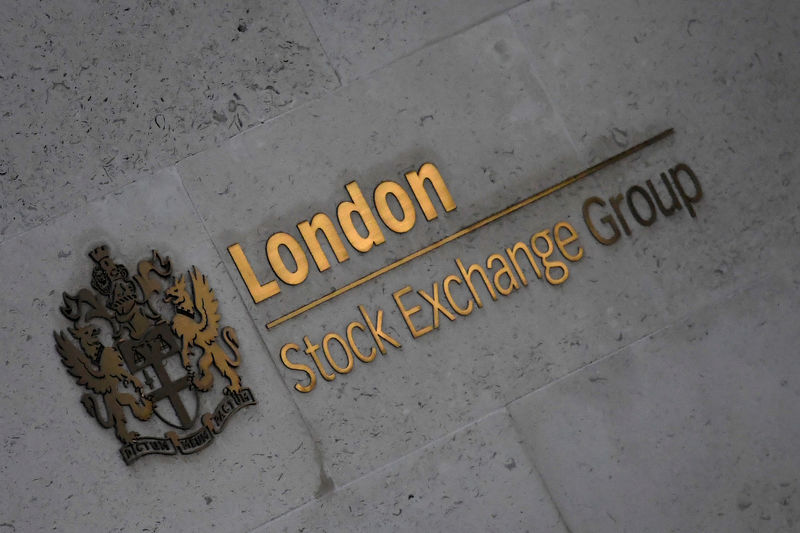By Tom Wilson
LONDON (Reuters) - World stocks edged to their highest in over 20 months on Thursday after the Federal Reserve cut rates even as it signaled it would hold back from further reductions, sending bond yields and the dollar down.
MSCI's world equity index, which tracks shares in 47 countries, rose 0.1% to its highest since early February last year, with many investors remaining expectant of further easing in spite of the Fed's slightly hawkish tone.
The U.S. central bank on Wednesday cut rates by a quarter of a percentage point, its third reduction this year, to help sustain U.S. growth in the face of slowdowns elsewhere in the world. Yet it signaled there would be no further reductions, barring economic shocks.
Asian stocks outside Japan had earlier forged ahead on the cuts, following Wall Street's advance to fresh record highs, climbing 0.3% to touch their highest since Jul. 30.
But the positive mood was tempered in Europe after a Bloomberg report that Chinese officials doubt a long-term trade deal with the United States was possible, which sent shares into negative territory.
The broad Euro STOXX 600 fell 0.4%, wiping out earlier gains, with auto and energy stocks slumping. German stocks, seen as heavily exposed to international trade, fell 0.7%.
A deal between Fiat Chrysler and Peugeot owner PSA to create the world's fourth-biggest automaker lifted Fiat Chrysler shares by 8.5%.
Wall Street futures were down around 0.3%.
Jerome Powell, the Fed's chair, had on Wednesday given an upbeat assessment of the U.S. economy and geopolitical risks from Washington's trade war with China to Brexit had eased.
Yet many investors held on to expectations that further rate cuts could come should the U.S. economy turn sour next year, and on Thursday money moved to riskier assets.
"Markets are discounting some more easing, but not very aggressively at this stage," said Klaus Baader, chief global economist at Societe Generale (PA:SOGN).
"We think the U.S. is going slide into recession, and that is likely some time around the middle of 2020. If the economy slides into recession, we think the Fed will continue to cut interest rates aggressively - even though this isn't mainstream thinking."
The dollar against a basket of six major currencies slipped 0.4% to 97.28, its lowest in a week, after rising a day earlier.
Bond yields also fell. German Bund yields, seen as a benchmark for euro zone government debt, were set for their biggest fall this month. U.S Treasury yields also dropped, extending a fall from Wednesday, and were last down around 5 basis points on the day.
Emerging stocks rose 0.3% to their highest in three months, and were on course for a second straight month of healthy gains.
The U.S. central bank had dropped a previous reference in its policy statement that it "will act as appropriate" to sustain the economic expansion - language that was considered a sign for future cuts.
Even so, market players said they thought the Fed could act should geopolitical risks flare up.
"I think the Fed is likely to remain in a wait-and-see position in the short term," said Christophe Barraud, chief economist at Market Securities in Paris.
"If there is a big disappointment on the trade front, that would likely to lead to another wave of tariffs and a major risk for the U.S. economy."
POLICY TOOL BOX
After the Fed cuts, the S&P 500 index closed at another record high on Wednesday, though some in the market voiced concern that central banks across the world lack room to respond to any economic downturn.
"I'd be worried that there isn't enough in the tool box," said Neil Wilson, chief market analyst at Markets.com. "The Fed is in a better state than most, but I'm not sure what Europe and Japan can do."
The Bank of Japan kept policy steady on Thursday, but introduced new forward guidance - a pledge central banks make on future policy - that commits more strongly to perpetuating ultra-low interest rates.
The Japanese yen rose 0.6% to 108.19 per dollar, its highest in two weeks, holding onto gains after the BOJ's move and boosted further after the Bloomberg report.
In commodity markets, oil prices were steady despite bearish signals from rising U.S. crude oil stocks and weak factory activity in China.

Brent crude futures were last down 0.2%, or 18 cents, at $60.43 a barrel.